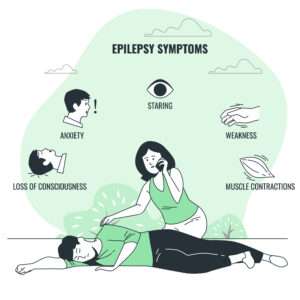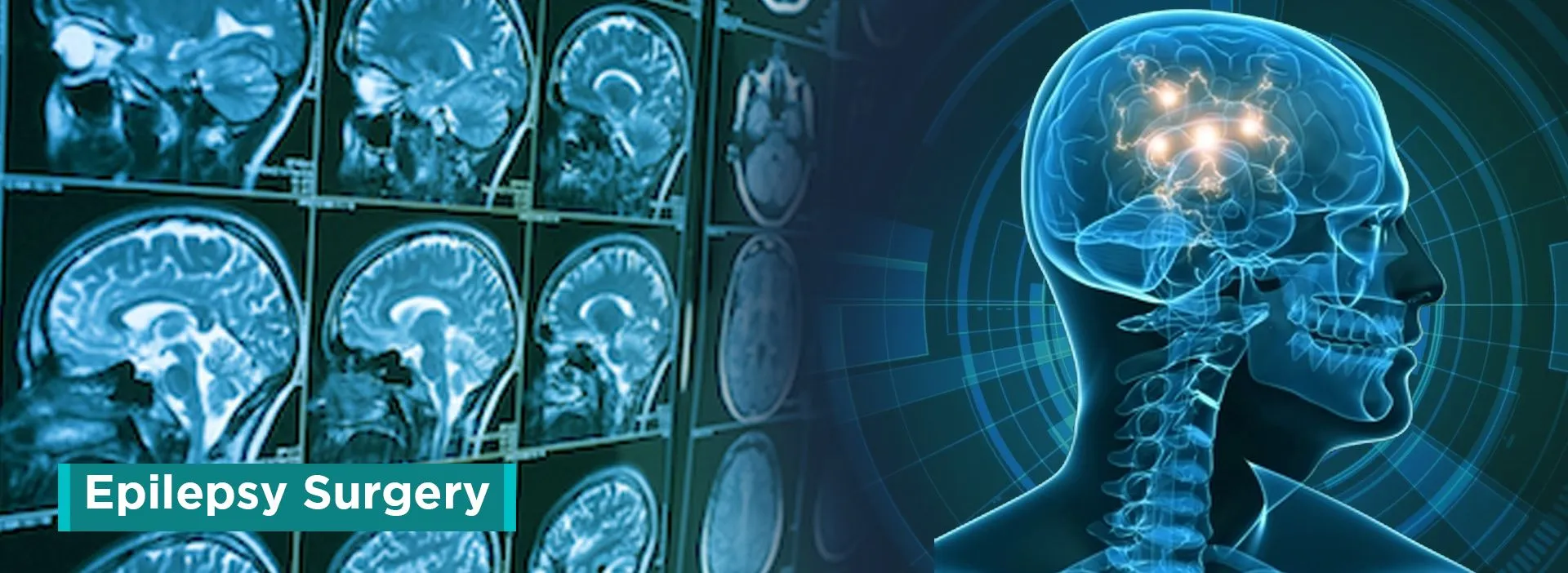Epilepsy Surgery in Mumbai
Epilepsy is a non-communicable brain illness that affects approximately 50 million individuals globally. Recurrent seizures are brief episodes of involuntary movement involving a section of the body (partial) or the whole body (generalized).
Epileptic episodes are occasionally accompanied by loss of awareness and control of bowel or bladder function. Excessive electrical discharges in a set of brain cells cause seizure episodes.
Such discharges can occur in many areas of the brain. Seizures can range from minor attention lapses or muscle jerks to severe and lengthy convulsions. Seizures can occur at any time of year, ranging from once a year to multiple times a day.
Dr. Gurneet Singh Sawhney is committed to offering excellent epilepsy treatment in Mumbai to patients suffering from seizures. He is one of the best neurosurgeon in Mumbai. Moreover, he performs safe, advanced, and result-oriented epilepsy surgery in Mumbai. Hence, patients consider him as one of the top epilepsy surgeon in Mumbai.
Experience the expertise and precision of our skilled neurosurgeons
Symptoms of Epilepsy
 During epilepsy, a person exhibits abnormal behaviour, symptoms, and sensations, including loss of consciousness. Epilepsy has only a few symptoms.
During epilepsy, a person exhibits abnormal behaviour, symptoms, and sensations, including loss of consciousness. Epilepsy has only a few symptoms.
Patients may experience the following symptoms:
- Fainting or exhaustion throughout the body.
- Muscle contractions or spasms that are rhythmic.
- Forgetfulness, anxiety, depression, or staring spells are also prevalent.
Symptoms of Epilepsy
Patients may experience the following symptoms:
- Fainting or exhaustion throughout the body.
- Muscle contractions or spasms that are rhythmic.
- Forgetfulness, anxiety, depression, or staring spells are also prevalent.
Causes of Epilepsy
The following are the several types of epilepsy causes:
- Structural
- Genetic
- Infectious
- Metabolic
- Immunological and unknown
Epilepsy also occurs in the following conditions:
- Brain damage from prenatal or perinatal causes such as low birth weight, loss of oxygen, or trauma during birth)
- Genetic conditions or congenital abnormalities with associated brain malformations
- Severe head injury
- Stroke that reduces the amount of oxygen to the brain
- Brain infection such as meningitis, encephalitis, or neurocysticercosis
- Specific genetic syndromes
- Brain tumor
Book an Appointment Now!
Why is Epilepsy Surgery Performed?
- Stop the seizures or make them less severe
- Reduce the number and frequency of seizures
- Control seizures when medications fail
- Treat severe side effects of epilepsy medicines
- Prevent seizures that spreads to other areas of the brain
- Treat seizures that occur on account of scar tissue, brain tumor, birth defect, or arteriovenous malformation (AVM)
Types of Epilepsy Surgery
1. Curative Epilepsy Surgery
Curative epilepsy surgeries are performed to remove the seizure focus area without causing damage to the brain or loss of brain function. Curative epilepsy procedures include lobectomy, cortical excision, and hemispherectomy that focus on removal of the area of the brain that causes seizures.
Dr. Gurneet Sawhney, one of the top neurosurgeon in India, may suggest curative procedures only if the diagnostic tests pinpoint the exact origin of the seizure in the brain.
2. Temporal lobectomy
Neurosurgeons perform this surgery on patients suffering from temporal lobe epilepsy. There is a nearly 70% to 80% reduction in the intensity of the seizure or complete control. The patient’s memory and language can be affected if the surgery is performed on the dominant hemisphere.
3. Cortical excision
This surgery focuses on removing the outer layer of the brain at the focal area of the seizure. The cortical excision surgery has promising results with significant improvement in seizure control in nearly 50% of the patients.
4. Hemispherectomy
The neurosurgeon will remove the outer layer and the anterior temporal lobe in one section of the brain. Surgeons perform hemispherectomy on children in most cases. It is performed on patients who suffer from intractable seizures and are weak on one side of the body.
These patients usually have a damaged hemisphere in the brain. Post hemispherectomy, the patients show remarkable improvement in attention span, behaviour, and cognitive functioning.
5. Palliative Epilepsy Surgery
Palliative epilepsy procedures focus on reducing the frequency of seizures and/or their severity. The patients have to undergo in-depth testing to locate the exact source of the seizure and the impact of its removal.
Palliative epilepsy procedures are critical procedures as they could affect the quality of life, especially mobility and speech. Palliative procedures include corpus callosotomy, multiple subpial transections, vagus nerve stimulation (VNS), and deep brain stimulation (DBS).
6. Deep brain stimulation (DBS)
During the DBS procedure, the surgeon places a pair of electrodes in the brain. The generator that controls it is implanted in the chest. The frequency and its levels are customized as per the patient while the stimulation remains continuous.
7. Corpus callosotomy
This procedure is a preventive surgery that focuses on preventing the spread of generalized seizures from their original location by disconnecting a section of nerve fibres across the corpus callosum. In the first surgery, the front area of the corpus callosum is sectioned. If the patient does not improve, then the rear area of the corpus callosum is treated in the same manner.
There have been instances of the issue in left-right motor coordination, mutism, and apathy in patients who have undergone total corpus callosotomy. This procedure is a curative and preventive procedure done to prevent the spread or the intensity of seizures.
8. Multiple subpial transections
This procedure involves the creation of small incisions in the brain, especially in the seizure focus area, so that they interfere with the spread of the seizure. This procedure is done in combination with lobectomy or alone. Surgeons perform multiple subpial transections in the seizure focus area in the brain’s vital area, which cannot be removed.
9. Vagus Nerve Stimulation (VNS)
In this procedure, the neurosurgeon implants a device that performs functions similar to a heart pacemaker. This device produces electric signals to prevent seizures. The patient can switch on the device indicating the onset of a seizure, and electric signals will be sent to the brain through the vagus nerve.
Neurosurgeons perform VNS on patients who cannot undergo brain surgery. It is not a cure for epilepsy and is not successful in all patients. It can reduce the seizure frequency to about 30%.
The patient could suffer from mild hoarseness in the voice and tingling sensation in the neck in the event of stimulation.
Don't let neurological conditions hold you back
Why Choose Dr. Gurneet Sawhney for Epilepsy Surgery in Mumbai?
- Our staff will prepare you before epilepsy surgery in Mumbai to know precisely what to expect.
- A coordinator will lead you through the process and help decide what recovery and rehabilitation services are required.
- After surgery, you will have follow-up tests and assessments.
- There are various types of epilepsy surgeries in which Dr. Gurneet Sawhney has his expertise. These include brain surgery, deep brain stimulation (DBS), and vagus nerve stimulation.
- Dr. Gurneet Sawhney relies on the most advanced techniques when it comes to treating epilepsy through surgery. He is regarded as one of the best neurosurgeon in India to perform critical surgeries.
Frequently Asked Questions
Seizures can also cause by emotional stress. Emotional tension is usually linked to a circumstance or event that holds particular significance for you. It could be a circumstance in which you feel powerless. Worry or fear, in particular, is the type of emotional stress that causes the majority of seizures.
People who have uncontrolled seizures should avoid scuba diving, rock climbing, skydiving, hang gliding, and mountain climbing. These sports need complete focus, and a loss of consciousness can harm the patient.
Epilepsy is a medical condition, not a mental illness. The great majority of epilepsy patients do not have any cognitive or psychological issues. Psychological difficulties in epilepsy are mostly limited to patients who have severe, uncontrolled seizures.
While many varieties of epilepsy necessitate lifetime treatment to control seizures, other people’s seizures eventually fade away. Adults and children with severe epilepsy have a lower chance of being seizure-free, but seizures may lessen or stop with time.
Many people who have epilepsy can live a normal life. They may also require support with day-to-day tasks. On the other hand, patients with long-term epilepsy or epilepsy that is difficult to control are more likely to be unemployed.

